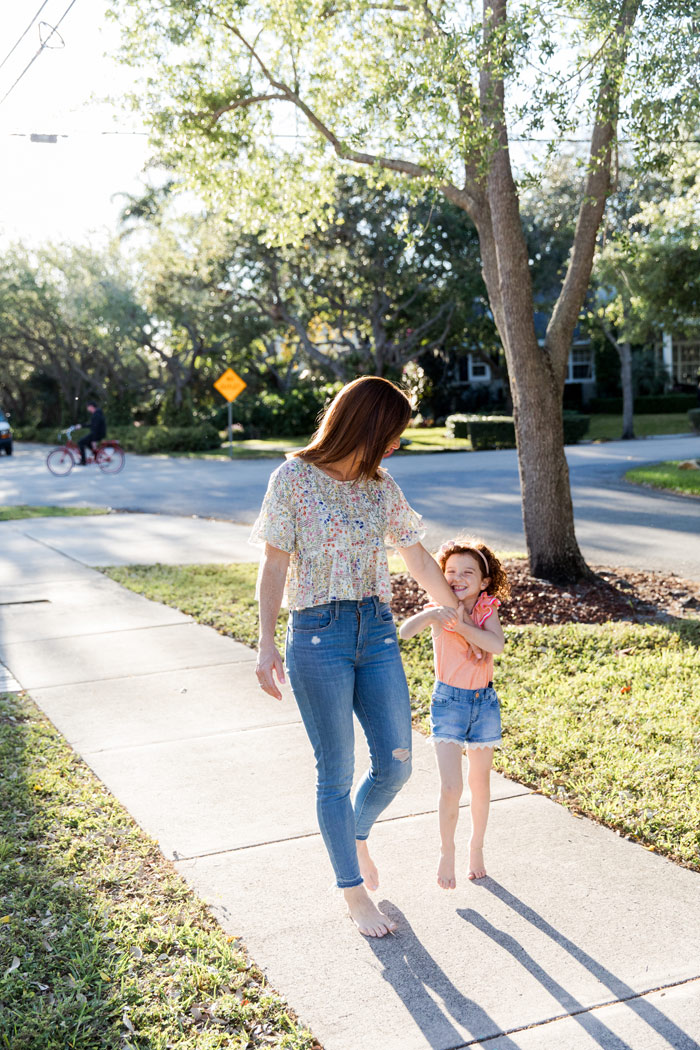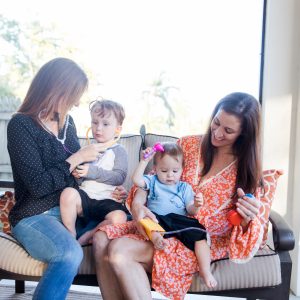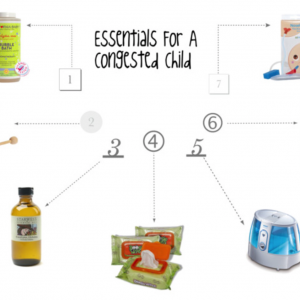
Listening, Not Fixing – The Best and Often Most Difficult Parenting Advice
From the moment we become parents, overwhelming feelings of love, adoration, and a fierce protective instinct take over. Feelings and emotions that, at least for myself, are completely new and uncharted. As parents, we feel a need and instinct to protect our children and to shield them from pain, sadness, and hardships. We want to make life easier for them by preventing any struggles and solving any problems. But what do our children learn if we always swoop in and rescue them? How does this tendency to “helicopter” parent shape their personality and prepare them for life on their own? Is our natural instinct to protect our young always what’s best for kids moving into their future and adulthood?
Are you a helicopter parent?
In today’s society, it seems the “helicopter” parent has become the standard of parenting. Living in the era of social media, we have new pressures and new problems that our own parents didn’t have. Our immediate circle of friends and family used to be our main influences and provide advice on family, parenting our children, and really every part of our lives.
Today, everyone’s parenting styles and decisions influence our decisions. We also receive unwarranted judgement, opinions, and ridicule by fellow parents, even strangers. We live in a different world these days. A world we need to navigate appropriately, making decisions based on the best interests of our families and lifestyles, not on what the world wide web believes. Even as adults, this idea is challenging.
Can you imagine how challenging it is for our children?
With social media and the internet becoming the crux of our lifestyles, more than ever, our children need to learn to solve their own problems, to make responsible decisions based on the morals and values instilled in them, and be able to navigate through the pressures and influences of social media and society.
#TalkEarly Summit
Starting a blog and becoming influencers has afforded us some unbelievable opportunities and experiences through our journey. We partner with some outstanding businesses, meet amazing people, and are honored to offer advice and education for fellow parents. One of the most influential and powerful companies we have partnered with is Responsibility.org and the #TalkEarly Team. The Team’s mission is to guide parents through raising respectful leaders who make responsible decisions about alcohol and life in general.
In Washington at the TalkEarly Summit, we had the pleasure of meeting Phyllis Fagell, a licensed clinical professional counselor, certified professional school counselor, and journalist. Her new book Middle School Matters was just released in August to rave reviews! She led the conversation on a multitude of parenting topics at the summit, which were all eye opening and extremely helpful in my own personal journey as a parent.
One of the topics that truly resonated with me and the rest of the team was Phyllis’ focus on LISTENING to our children, NOT FIXING their problems for them.
The Journey Away from Helicopter Parent
Parenting roles change so quickly. With babies, parents are the problem solvers. When your baby is hungry, you feed him. Tired – you rock him to sleep. Sad – you make him smile. It is the phase of parenting where all our natural instincts of protection, problem solving, and care are in full effect.
But in the blink of an eye, our babies are toddlers, pre-schoolers, and then pre-adolescents. They develop their own opinions, interact with other children and adults, and become aware of problems, emotions, and life’s challenges. It is hard to transition from that all encompassing, protective, soothing figure to one who needs to back off a bit and provide our children with the right tools to fight their own battles.
It is a difficult transition but a crucial one in their journey to adulthood.
At this stage, listening to our children and simply providing them with the tools to solve their own problems is more important than ever.
As our parenting journey continues into the teen, high school, and college years, we want our young adults to have a strong foundation and confidence to be independent, responsible, and have all the tools they need to solve their problems and make wise decisions. These years are difficult and children are surrounded by peer pressure, social media pressure, sex, alcohol, and drugs. We must set our children up for success during the earlier years to prepare them to make responsible life choices about friends and the social pressures that surround them.
So what are the best ways we can provide our children with the nurture, love, and tools they need to become strong, independent, responsible adults?
Listen – Do Not Fix
Phyllis Fagell stressed the importance of coaching, not controlling our children and their life decisions.
I LOVE this imagery!
This step is the first one in not only teaching our children to problem solve, but also showing them the importance of good listening skills.
It is so hard to see our children upset, flustered, or in pain and NOT sweep in and save the day. We all know the story of the school bully and how different parents react to their child being bullied. But instead of calling the teacher or the bully’s parents, what if you simply listened to your child and empathized with what they are going through, while providing them with tools to handle the situation on their own? You would be teaching them problem solving skills, confidence, and respect.
What Does It Mean To Be A Good Listener
Phyllis Fagell said it best at the #TalkEarly Summit when she said to “coach, not control.”
It can be so hard to not use all of our own years of experience, past mistakes, and challenges to control how our children deal with specific problems. Although you may feel this control is helpful in the moment, it is not best for their future adult selves.
Instead, coach them with advice and perspective. Help them come up with their own thoughts, opinions, and solutions to their dilemmas and problems.
Tips for Parents to Consider
So where do you start? Phyllis Fagell had excellent advice on how to navigate these transitional waters. Next time your child has any problem you would normally handle yourself, consider these tips instead:
- Is your child identifying this situation as a problem, or do YOU think it’s a problem?
- Don’t interview your child like you’re digging for information or stirring the pot. Be present in anything they willingly share.
- If your child says they have a problem, ask what outcome they want. Ask what kind of steps they could take to solve this problem.
- Ask “What’s the worst idea you can think of?” and turn it into a fun activity. Guide your child to consider two good pieces of that bad idea. Allow them to think critically and gain a sense of empowerment.
- Ask “what have you tried?” or “what are you going to try next?” Give them control. Show them that they can solve their own problem.
Uncertainty fosters stress in children. We give our children a sense of empowerment and control by guiding them through the process but allowing them to be the main architect of the solution. This idea is the ultimate sense of “coach, don’t control.”
Final Thoughts on Breaking the Helicopter Parent Cycle
Our ultimate goal is to raise responsible, independent, happy, healthy children. Breaking the cycle of helicopter parenting is the first step to giving our children the independence they need to succeed in life.
I strongly urge every parent to speak with their kids about positive peer friendships, making wise decisions, and being responsible leaders for their friends and peers. And as always, if you need conversation starters or other resources, check out Responsibility.org!
Dr. Katie
I am proud to be a #TalkEarly blogging ambassador for Responsibility.org. This is a Sponsored Post! While I have received compensation, all opinions are my own.
Check out some of Phyllis Fagell’s amazing advice from the #TalkEarly Summit:




